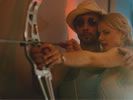Eye For Film >> Movies >> Left Bank (2008) Film Review
With a few notable exceptions, like Harry Kumel's magnificent lesbian vampire art piece Daughters Of Darkness, Belgium is hardly renowned for its horror cinema. Happily this feature from Pieter Van Hees, who earlier gave us the delightfully tasteless short Black XXX-Mas, proves that national stereotypes are there to be broken, with an intelligent occult mystery thriller that delivers T&A and shocks for the exploitation horror crowd and more substance for the fantastique and subtext inclined critics.
The story centres around Marie, a young Antwerp woman who has dedicated herself body and soul to qualifying for the European track running championships in Portugal. Her world then begins to fall apart as, following the qualifying heat, she collapses. The doctors indicate that she is suffering from iron deficiency - significantly her periods are irregular - and prescribe a month resting; going to the championships is out of the question.

Finding it impossible to stay cooped up at home with her mother, an ageing hippy type who runs a health food store, Marie spontaneously decides to move in with Bobby, an archer and used car salesman she met at the athletics park. They make love and Marie, living a life of not having to worry about what she eats, drinks, smokes or does for the first time, falls for Bobby.
Then Marie starts to uncover the secrets of the building, centring around the disappearance of the last inhabitant of the apartment, built on the Left Bank of the River Schelde atop a former dumping ground for the city's poor and diseased. But is it already too late.
Although the film features many images of Marie naked or in her underwear, almost as many as there are of her clothed, these prove as much naturalistic as voyeuristic and exploitative. I particularly appreciated the way in which, getting up in the morning after making love with Bobby for the first time, Marie didn't move to pull the covers over herself but instead just got out of bed naked and went about her business: for once we didn't get that Hollywood self-consciousness about the body, with those double-height sheets that conveniently cover up the same parts that were on display on screen only a few moments previously.
The horror, suspense and mystery elements could be described as reminiscent of Polanski - most obviously Rosemary's Baby and The Tenant - and The Wicker Man, all classics of realist / mundane horror, crossed with the more supernaturally inclined work of H P Lovecraft and his disciples (think “Black Goat of the Woods with a Thousand Young”). After an opening stinger we start off in the mundane world, before the gradual accumulation of little signifiers - flowers, Bobby's Ouroboros medallion, Marie's strange vaginal discharges and non-healing wounds - combines to build an atmosphere of mounting doubt, dread, paranoia and helplessness in the face of an ancient, unknowable evil.
This said, genre fans are likely to guess what's going on sooner that the characters, as when a sealed box labelled samh--n with two letters obscured crops up. Like everyone else they will still be wondering how it's all going to pan out, however.
This ending - which I won't spoil - itself proves vaguely reminiscent of Fulci's Lovecraftian masterpiece The Beyond, in which the heroes found themselves in flat landscape, devoid of detail bar the mummified corpses on the ground that revealed the space to extend in all directions and none, into infinity. While the same doesn't happen here, in line with the more earthly, maternal, circular and grounded approach that director Pieter Van Hees takes in contradistinction to The Beyond's transcendental, there's the same ambiguous sense Fulci spoke of - having neither a happy ending nor an unhappy one.
The filmmakers also keep you wondering about the characters and their motives throughout: if the references to the black hole as “the devil's vagina” (or c-word; seeing as vulgar / vulgate latin doesn't get the more vulgar English translation in the subtitles) are a by-now predictable invocation of monstrous feminine formulations for the critics to hang their theoretical hat upon, as is the invocation of the cellar as a womb-like space to be read through your favourite theory (my own would be Gaston Bacherlard's Poetics of Space) the way in they also play upon movie stereotypes of Russian migrants as gangsters, pimps and people-traffickers makes for a pleasing reversal or two.
Technically the film is well put together, with some nice use of contrasting techniques in Marie's dreams / nightmares and other subjective sequences, some of which accelerate into an impressionistic blur of fast cuts and camera movements. The scoring is also effective, being harsh and loud without adopting the nu-metal stylings that have marred so many recent Hollywood productions.
The performances also work, with newcomer Eline Kuppens making for a credible heroine even if some of the things Marie does do not quite convince, while Mattheas Schoenarts giving Bobby a convincingly attractive bad boy air. The supporting players exude an air of authenticity: if these are black magic cultists, then they look just like your friends and neighbours, being downright average in every other respect.
Reviewed on: 24 Jun 2008

















